I wouldn't trust predator population to stay low. When we moved out here, we had predators, but they never found our ducks. We lost one duck the first year when we didn't put them away in time, but once we started housing them on time, they were safe...until the next fall. Last fall we lost 5 ducks and one chicken to predators (likely a bobcat), in the span of 6 days. We lost one of them at
noon on a stormy day, while I was outside watching the ducks. It was crazy and horrible (
https://permies.com/t/50703/ducks/critters/Ack-Disappearing-Ducks). Evan Peirce also lost about half his flock (if I remember right) when winter came (
https://permies.com/forums/posts/list/640/45960#437671)
Supposedly, raccoons can smell a duck from a mile away, and travel that distance looking for tasty dinner. Also, many predators seem to be migratory. And so while you might not have any predators now, they might show up in the fall. Or, those predators might be eating easier to catch bunnies, etc, right now. But, they may run out come fall and winter and decide your ducks look like good dinner. And, once they know the ducks are tasty and they can eat them, they will keep coming back until your ducks are all gone. I've also read about people having their whole flock destroyed in one night by a predator that came in and killed them all.
Having said that, I would definitely build them a secure structure, and put them in it every night before the sun sets. Ours is 8x8feet, which I figured would be roomy enough for 20 ducks...though we currently only have 10 (thanks to predators and also having too many males). Our duck house construction can be seen here:
https://permies.com/forums/posts/list/37721#316150. We thankfully had a concrete pad to build on (and so don't have to worry about predators digging under), and we used hardware cloth on any gap more than 1/8th inch, and wrapped the hardware cloth under and pinned it down with cement blocks so predators couldn't crawl under it. Make sure the hardware cloth is galvanized, as it really stinks to have to redo things when the metal rusts (made the mistake of not checking and got non-galvenized fencing. Less than 2 years later, and my fence needs to be replaced. What a waste of time and money!).
But, yeah, like people told me when I built my enclosure and house, you really can't be safe enough. Make the house as secure as you can, because it is horrible to lose your flock, and once a predator knows you've got an open buffet, they'll be coming back for seconds until all your ducks are gone.
Anyway, to actually answer your questions:
What sort of factors are important when designing a duck house? Size and nesting boxes. If you have a larger house, you can get away with a lot more. I noticed that when I had my duck house crammed, they were getting stressed and weren't laying because they didn't have any privacy. When my flock was smaller, they just laid happily in the corners. I ended up building four nesting boxes to the side of the house, and that made eggs a lot easier to access, easier to find, cleaner, and more frequent. Ducks like a dark, secluded place to lay. I found plastic crates
did not work for my medium-sided ducks. They never used them. You probably want the nesting box to be at least 18 inches long, and 10 inches wide. You can make them out of most anything (look up ideas online.)
What materials can be used? We've got sheet metal, cord wood, cob, cinder block, bottles, urbanite, field stone, straw, and broken brick. All those should be good. Avoid cedar and treated wood if you can, though we used both. I don't really worry too much about it, because it's the walls and they don't really disturb the wood to let of fumes, and I've got a lot of ventilation.
Does it have to be locked up tight like I see online? With fences going down into the ground a foot? Pretty much! Though, if you ran hardware cloth all the way under your house (like it's the floor) that should work, too, as long as there is good overlap. You could also use the sheet metal for a floor and make sure there are no gaps between the walls and the floor. Folding the sheet metal up and around the outside of the wall for about 6 inches should work if you fasten it down well. You pretty much want to make sure nothing can burrow under and into your house.
What will we need to do to convince them to sleep there instead of our garage? I've heard stories of people building elaborate houses that the ducks never go in . Like Jo said, giving them a little feed when you put them away does wonders. It doesn't have to be much after a while. I do 1/2-1 cup of feed for 10 ducks...and did the same amount for 20 ducks. They go in, and I close the door, and all is good. Some people do all their feeding at night (as an incentive to have them forage more), but I don't want them filling the duck house with poop! So, I feed them most of their food about an hour before I put them away, and then just a little bit when I put them away. Make sure to supply drinking water (a pail works well, so they can't get in and splash, but they still can dip their bills in). I use the deep litter method for bedding, using pine shavings and turning every 1-3 days (more frequently when it's cold and rainy). This ends up making some nice compost/soil ammendment that I put around my fruit trees and cane berries and anything else that seems to need it in the fall.
As for eggs, well, I've had my own trials there. I currently have 9 female ducks that are of laying age (1-2 years)...and I get 2-4 eggs/day. They are anconas, Golden 300s and Blue Runner Ducks. These breeds are all
supposed to lay about 300 eggs/year, so like 7 eggs/day from 9 ducks. Ha! Don't ask me why mine aren't laying. I still haven't figured that one out!
In general, the amount of eggs you get really depends on a TON of factors: what breed they are, how old they are, how stressed they are, if you supplement lighting in the winter, how much you feed them, the protein content of their food, if they eat toxic things (like potato/tomato vines, legume seeds), etc, etc, etc. What breed(s) of duck do you have? Do you know how old they are? If you keep them penned until 9:00am, they should be finished laying by the time you let them out. How many are males/females?
Here's pictures of my duck house:
In Construction:
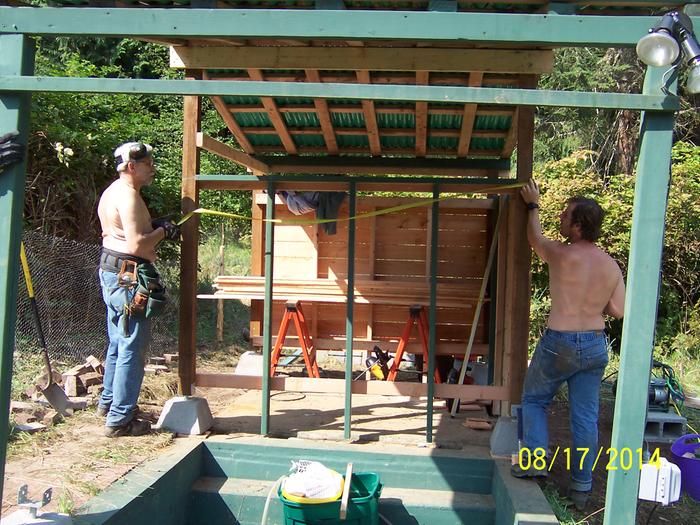
Built:
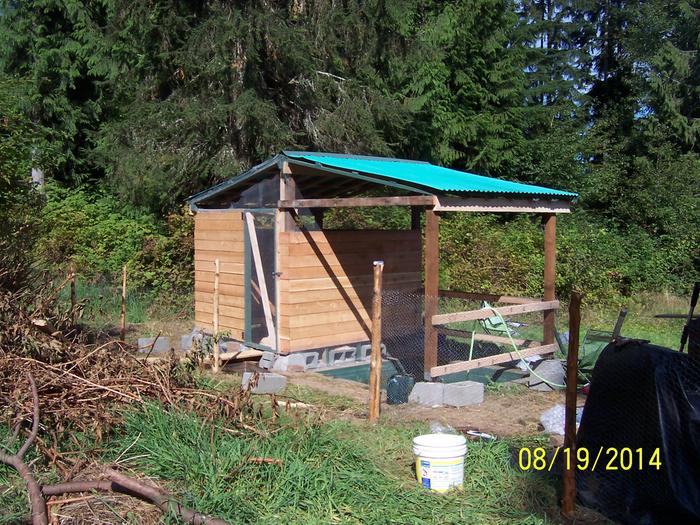
In Use, with Deep Litter (the plastic thing is a divider for them to lay in/hide from each other, the crate never gets used except by them sitting on it, and the can hanging from the ceiling is a heat lamp for when it's cold/we have baby ducks):
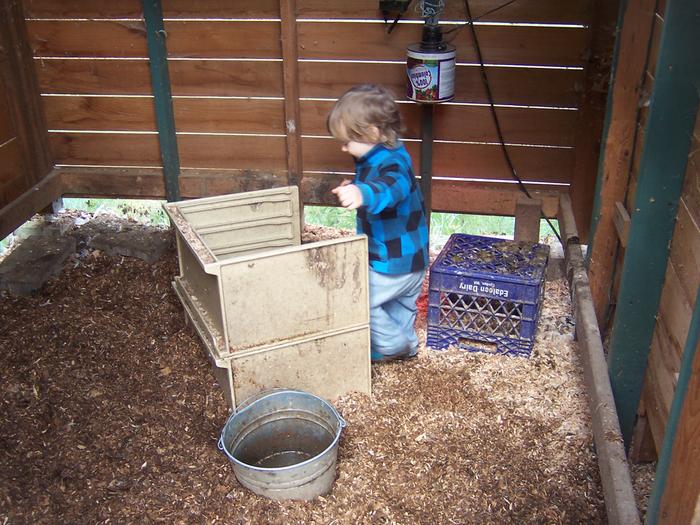
With Nesting Boxes:
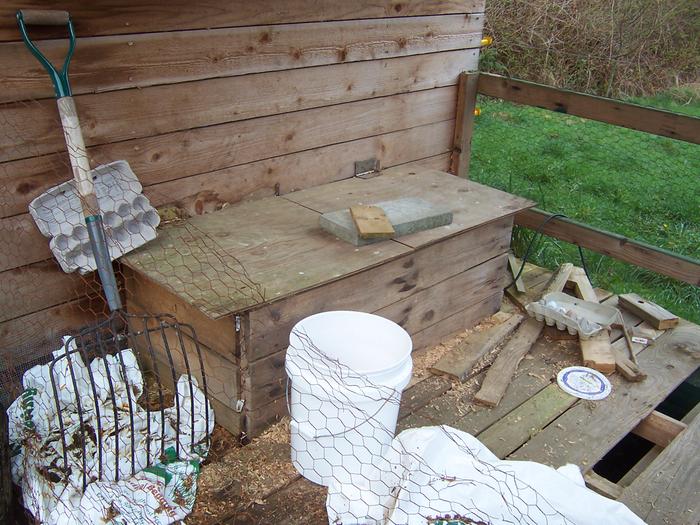
View into a Nesting boxes:
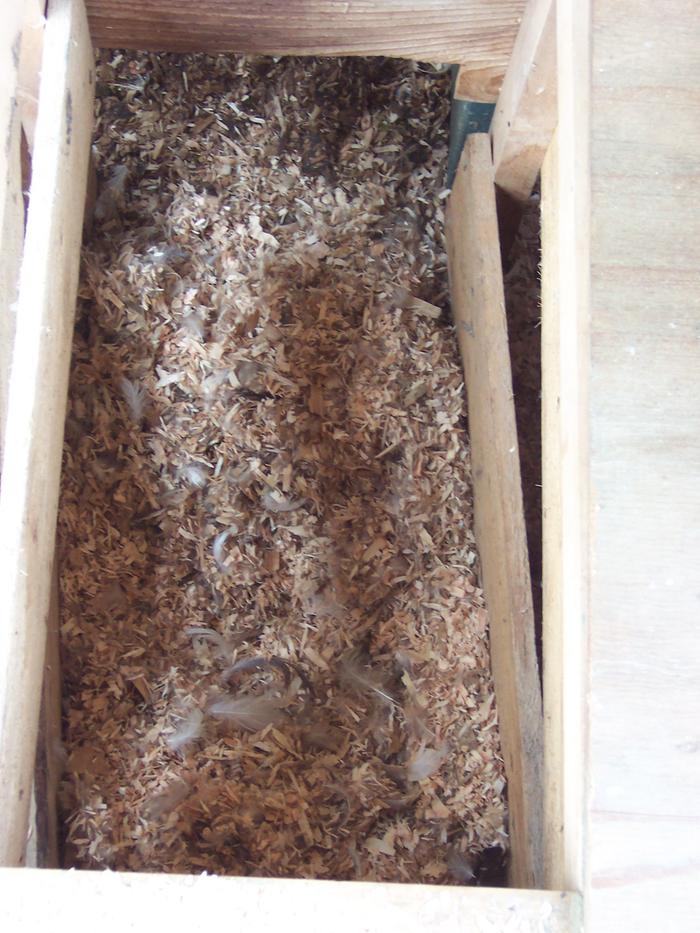
I hope that helps!

 1
1








 3
3









